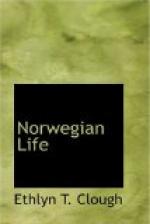The constitution of Norway, like that of the United States, invests all power in the people, who are represented by their legislature and their judiciary, with the king as an executive to administer the laws passed by the one, and enforce the decrees of the other. When the two houses of Parliament disagree upon a measure, they sit in joint session, when it requires a vote of two-thirds to enact it, and the approval of the king is necessary. He is also required to promulgate all the acts of the legislature. Many Norwegian statesmen assert that the king has no veto power, but merely temporary authority to suspend a law pending the action of the people. If three successive parliaments, after three successive elections, pass a bill in exactly the same terms, it does not require the sanction of the king when it is passed the fourth time. Thus the people may exercise their sovereignty.
All edicts of the executive, all decisions of the court, and all resolutions of the legislature are proclaimed in the king’s name, but the ministry is responsible to the legislature for the acts of the king, and if they are not approved, as in England, the ministry must resign and a new one be organized in sympathy with a majority of the parliament. The king may choose his own ministers, but they must represent the will of the people. They are called counsellors of state, are eight in number. Before the disunion, two of these eight counsellors were without portfolios, and resided alternately at Stockholm, while the other members presided over six executive departments in Christiania.
A record is kept of the meetings of the ministry by a permanent secretary, and the constitution requires that each minister shall express his opinion upon all questions brought up for consideration. He who remains silent is counted in the affirmative. No matter of business can be determined by the king without the advice of the ministry, unless an emergency demands a prompt decision, when he must take the responsibility of securing a ratification of his act. In the same manner the king may issue edicts of a provisional character in matters of commerce, finance, industrial activity, customs dues, police and military affairs during a recess of the parliament, subject to its approval within a limited time after reassembling.
The minister may act in the king’s name in cases of emergency or during his absence from the country, subject to his approval. These conditions were adopted in earlier times, when the Norwegian legislature sat only once in three years and some such power was necessary, but now that there are annual and often semi-annual sessions, and they have a king of their own residing always in Norway, it is very seldom necessary for the executive power to exercise such responsibility.
The king appoints all the officials of the executive part of the government, all the officers of the army and navy, and all the clergymen in the established church, but exercises this power through his ministers. Dissenting congregations are not subject to government control, and may choose their own clergymen, although the latter are required to register an oath of allegiance and a pledge to obey the laws of the nation and fulfill their duties with fidelity and conscientiousness.




